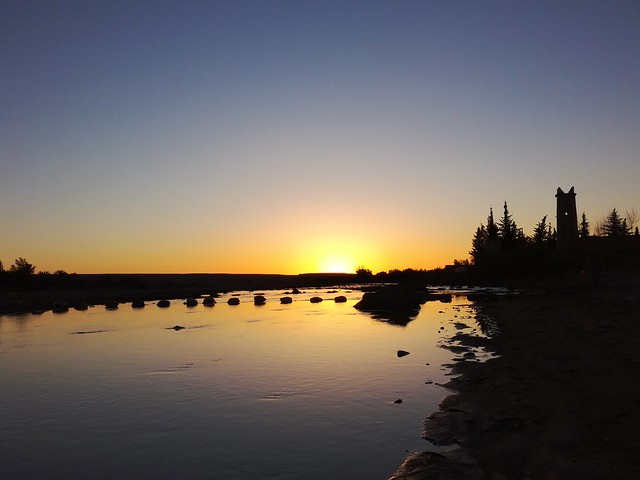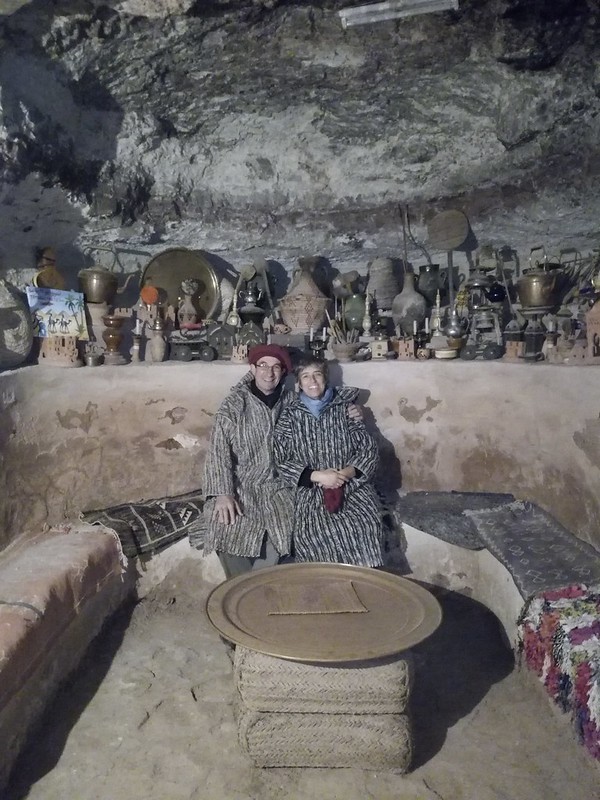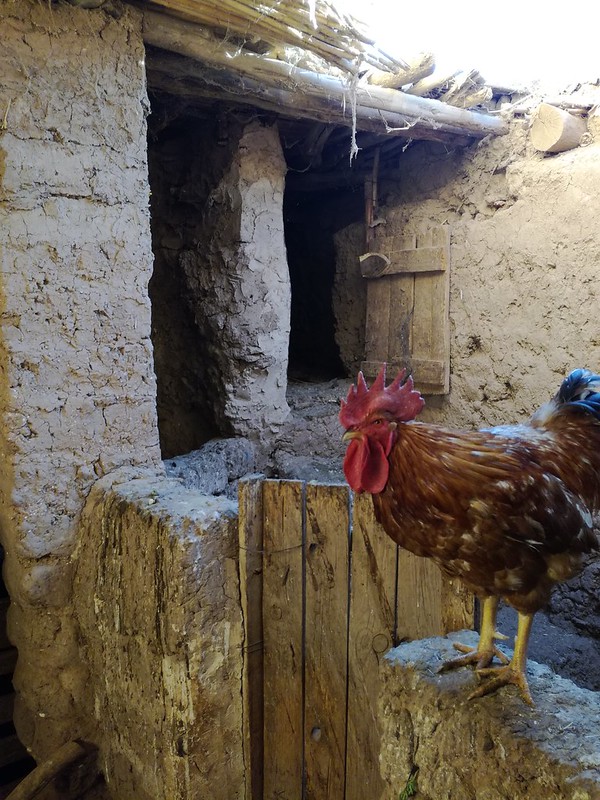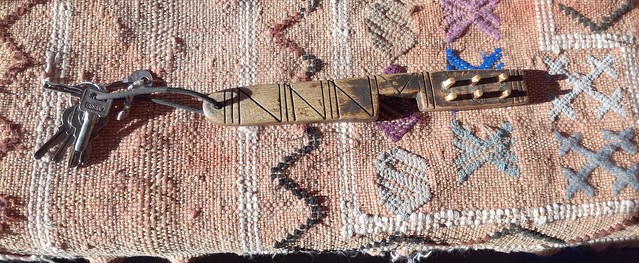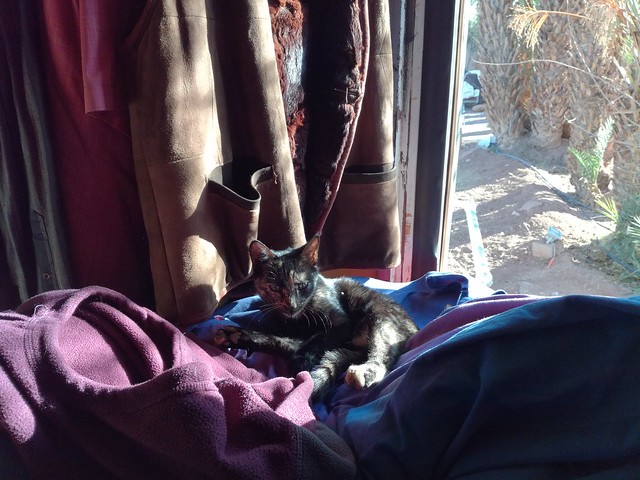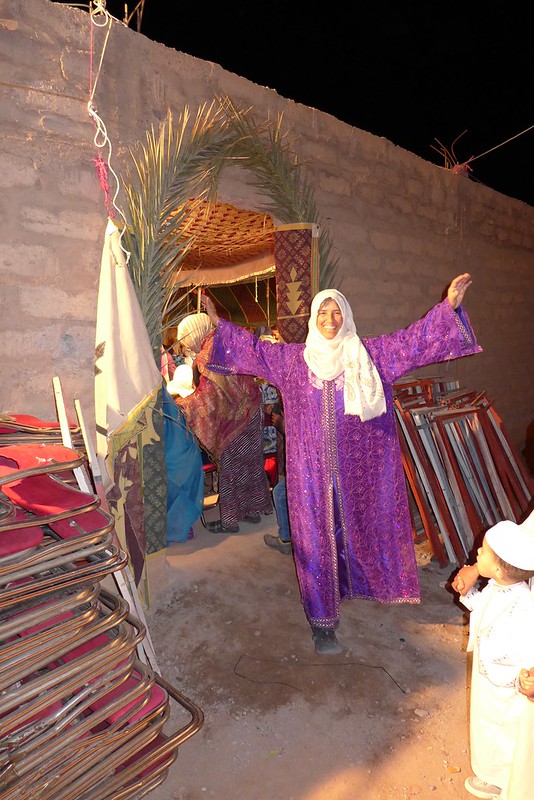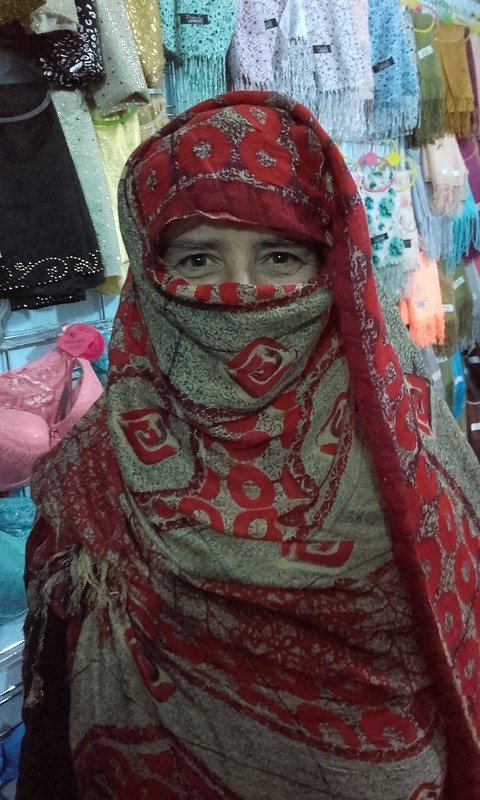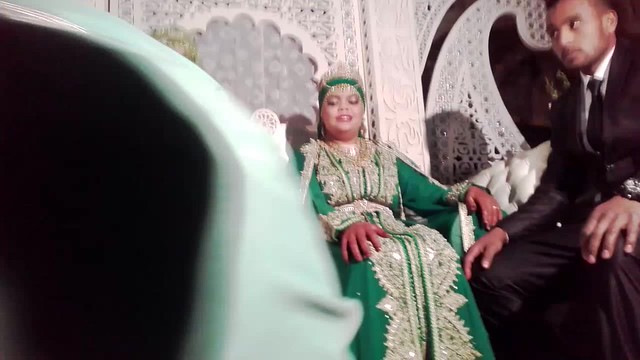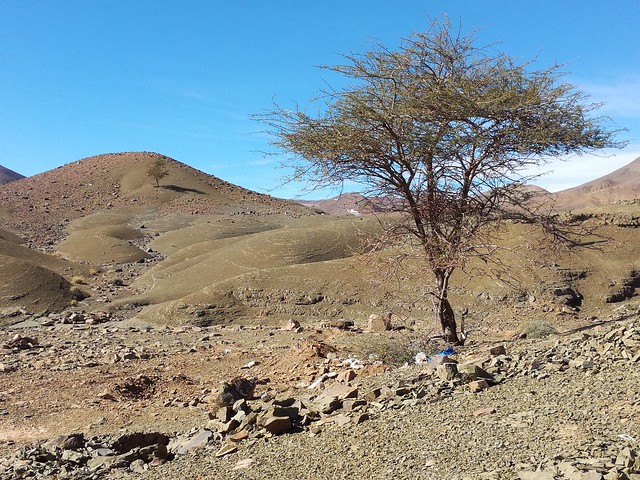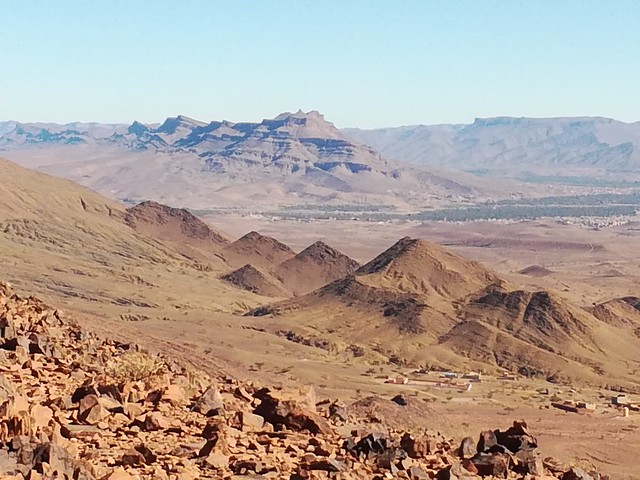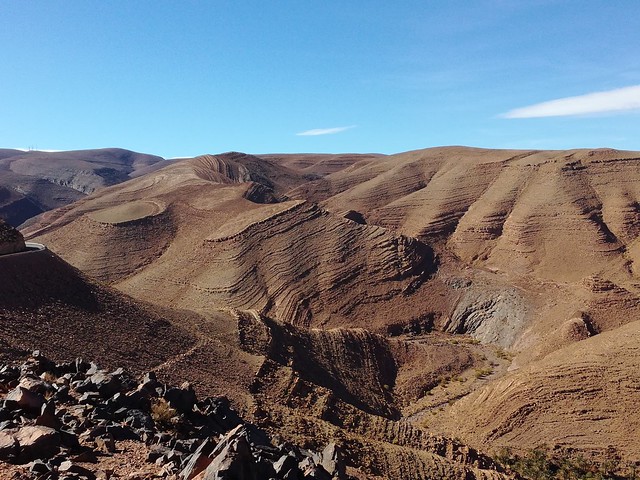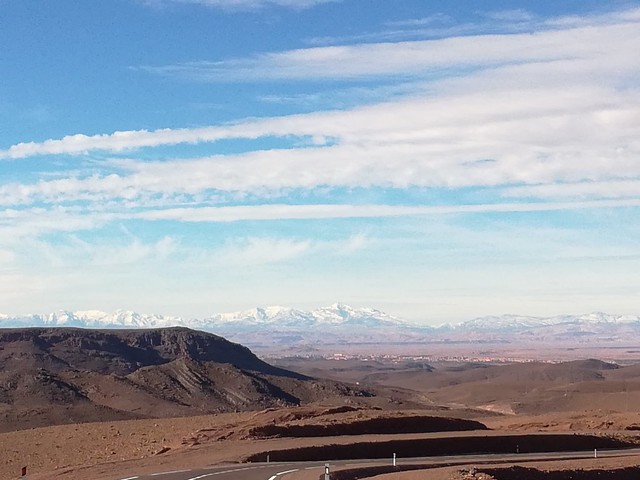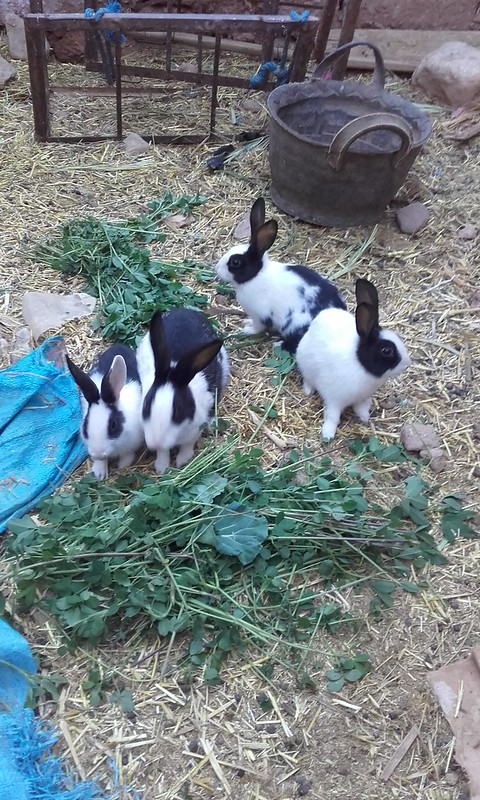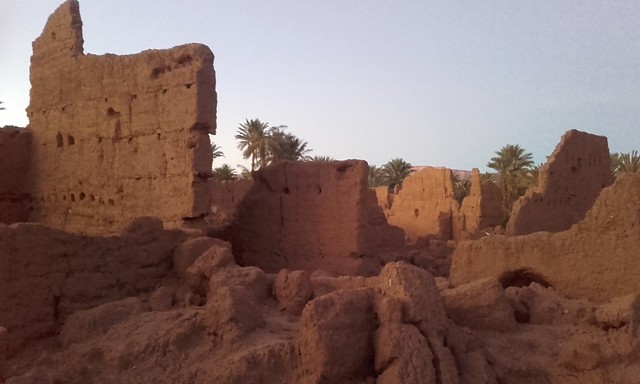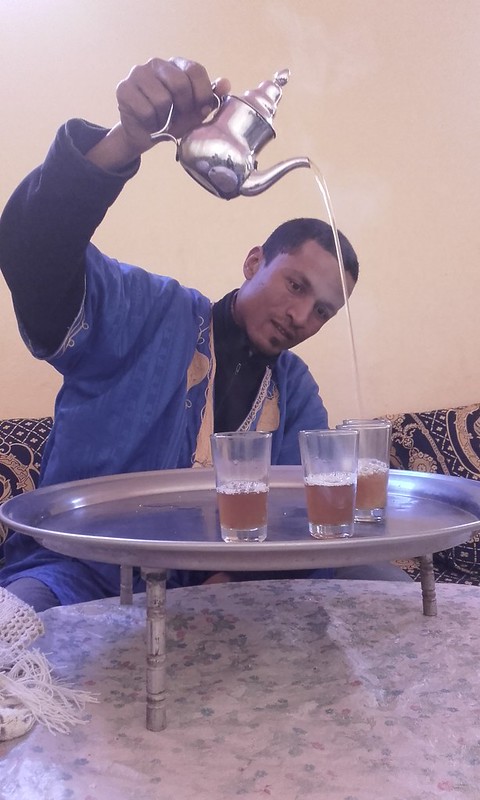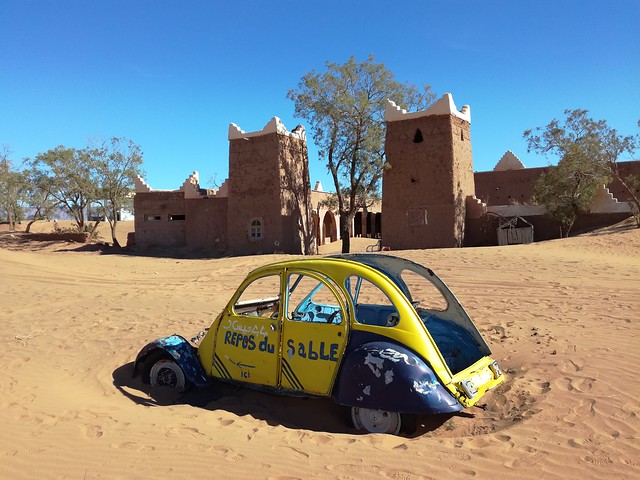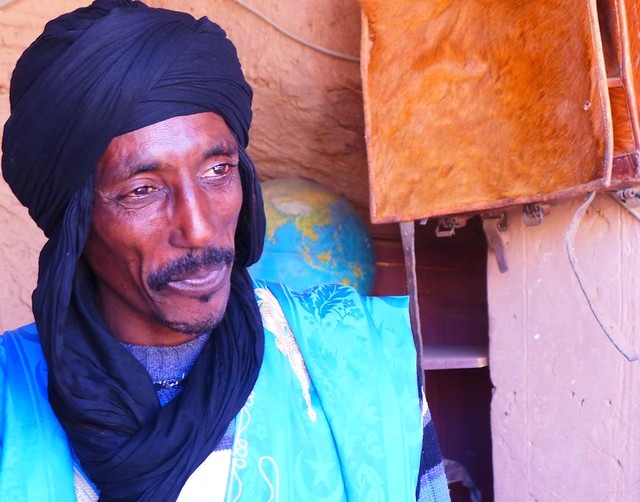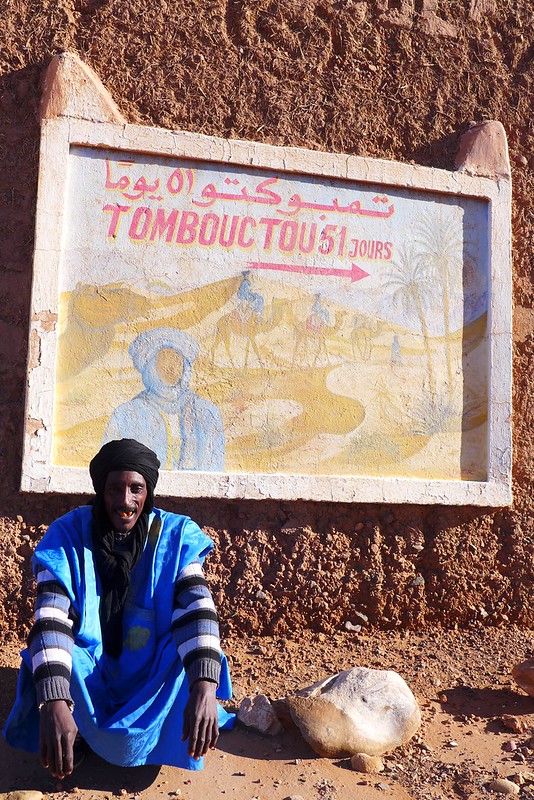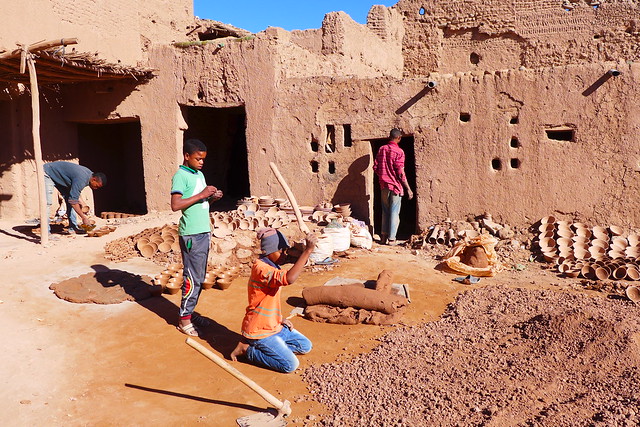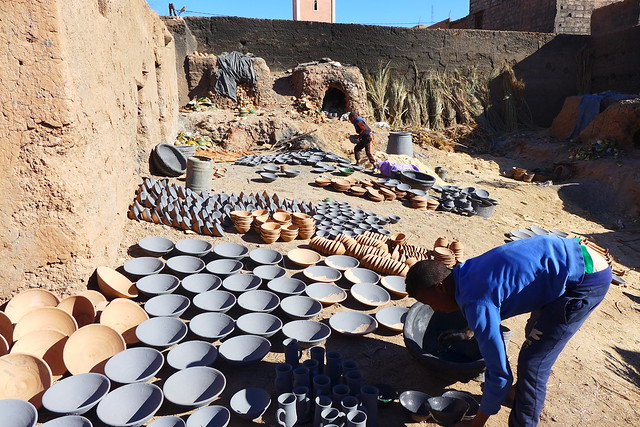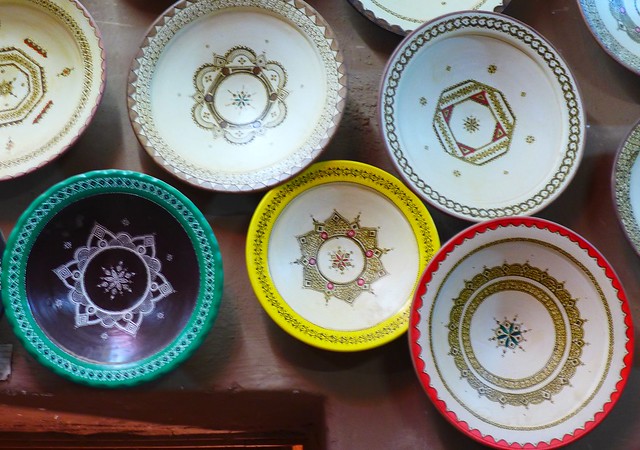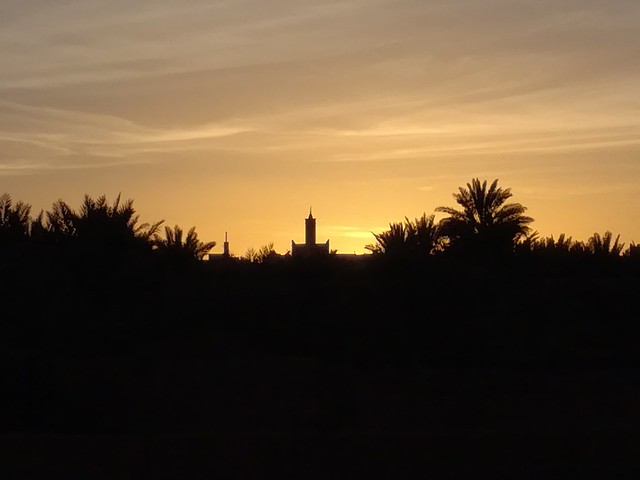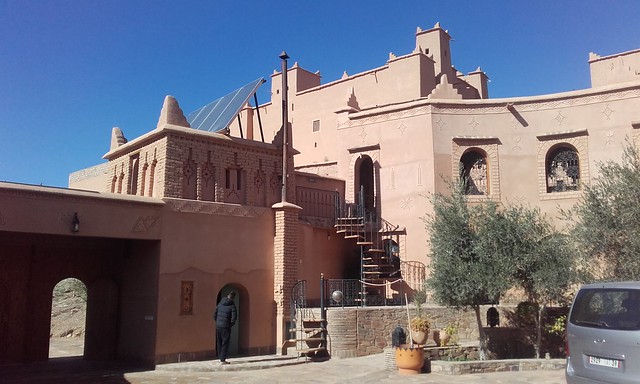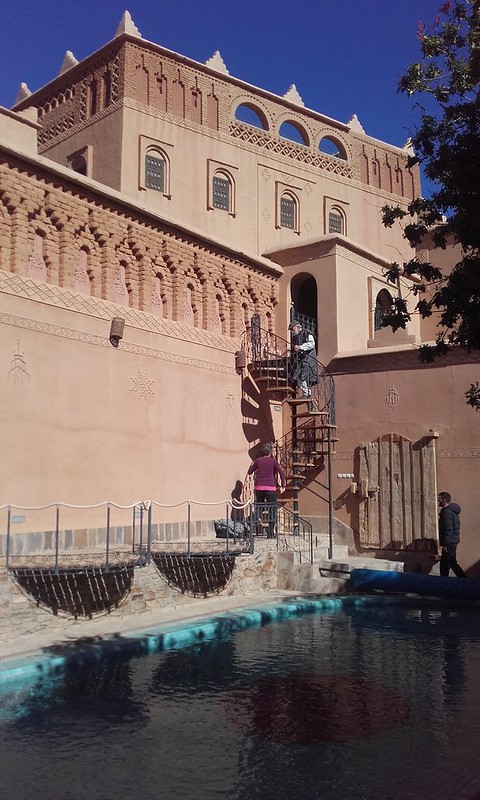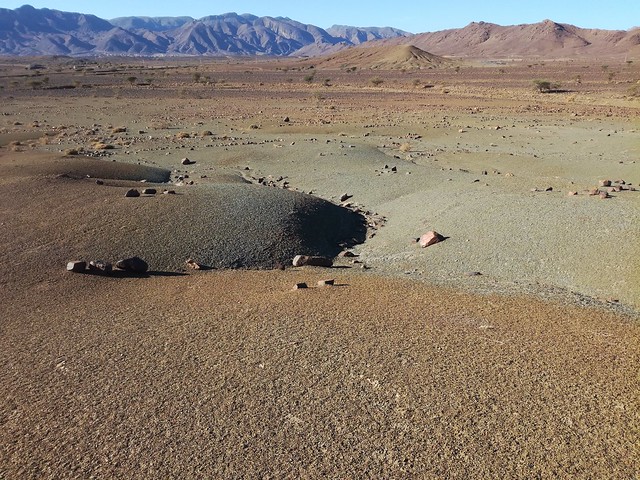Ait Ben Haddu
We’ve seen a great picture of Ait Ben Haddu at dawn in one of our books about Morrocco, so we’re up early to try and catch the sunrise on this famous Kasbah. We drive into town and park by the side of the road. Ait Ben Haddu has two parts; the ‘modern’ part by the side of the road, at this time of the morning a quiet village with dirt streets and mud-walled houses; and the old Kasbah which you can reach across a little pedestrian bridge or via stepping stones in the river.
We are early enough to have the Kasbah almost completely to ourselves. We climb through the narrow streets all the way to the top from where you have a fabulous 360degree view.
By the time we go back down, the village has woken up, some tourist shops have opened and the first groups of japanese or chinese tourists are coming up the narrow lanes.
We meet Mohamed who owns an old troglodyte house, which he has opened for tourists. Ait Ben Haddu has often been used as a filming location (there are some famous film studios just outside Ouzarzate too), and Mohamed has been an extra in quite a number of them. His house was also occasionally used – there is a cave-like room that was the filming location for a prison (can’t remember which film) as well as a wedding in Game of Thrones . Note the amount of items on the shelves, many of which have been film props!
In the heart of the house, we are astounded to find a tiny animal enclosure.
Mohamed entertains us royally, offering Berber tea and telling us many little details of his culture, for example the pegs on his keyring symbolising the members of the family, and how pegs get removed when someone dies.
We wend our way back through the streets of the Kasbah, past some very convincing sellers but we don’t have any money with us, so we are immune. When they suggest barter, we tell them about our bartering experience at the pottery in Tamegroute and explain that for us, bartering with a Morrocan is like a beginner trying to beat the master. We have no chance, even if the experience is educative. They laugh and let us go.
Frank gets sucked into an antiques shop where he gets offered an ancient compass, with various different metal discs full of star signs and other symbols. Apparently it will safely guide you through the desert and of course the vendor thinks it’s indispensable for us and much safer than GPS, which may fail you somewhere far away. A minor obstacle being not understanding any of the symbols on the instrument!
Many more pictures of Ait Ben Haddu are to be found here
Posted in Uncategorizedwith comments disabled.
Camping La Palmeraie
The Berber wedding has indeed knocked me for six. I think what really pushed me over the edge was witnessing the two young women being kept in this little room, wrapped from head to toe, sitting on a mattress, while their wedding took place outside with more than 300 people. It somehow gave a pupa-like feel to them – maybe this is what it is about, symbolically; a change from the girl/young woman to a married wife. Something dies and gets reborn in another shape. They are two sisters and at 19 and 21 years they are still quite young and somehow this upsets me, thinking back on how I was at that age, or how my children were, and I presume that a double wedding is held not because both of them have fallen in love at the same time but for economic reasons. It’s totally understandable – even done once, a wedding of this magnitude will challenge any family’s finances.
More upsetting is the feeling I get from the uncle who takes us to the brides. The proprietorial pride that emanates from him creeps me out. It somehow shifts the focus onto the subject of the girls’ virginity, and how this gets guarded by the family and then passed to the husband, as if it’s a property. I find it a very uncomfortable objectification of the woman.
The next day, fittingly, I’m ill in bed with cystitis. This gives me the space I need to reflect on my feelings, and I feel blessed to be in such a sweet campsite to heal myself and regain my centre. Frank goes off to the second and the third evening of the wedding, while I stay in bed, listening to the sound of the drums and reflecting on the preciousness of woman in our society, how it often gets owned by men, used and also abused. I feel the pain of all the women whose light gets dimmed or broken.
It takes me a few days to be ready to watch the video footage that Frank brings back from the wedding, but when I do, I also see how deeply uncomfortable the grooms are in their role, in this particular case they seem even more uncomfortable than the brides. I think of what it must mean for them, the full load of responsibility crashing down on their shoulders, and who knows, maybe they didn’t even personally know the woman they are now responsible for feeding. There is so much uncertainty in this country, so little paid work. Five years on from now they may not only have their wife to look after but also a bunch of children. Read back on our last few chapters and see how it can turn one way or another, there can be a happy family like in the case of Brahim or it can be a real struggle like in the case of Hakim.
The camping we are at has a special feel to it with its recycling facilities (the first time we’ve seen this here in Morocco) its garden and its animals. We stay for almost a week, becoming good friends with the cat. As Frank already mentioned, she moves into our van, nosily rooting about the place, climbing into all sorts of corners and we frequently have to tell her ‘safi!‘ (‘that’s enough’, or ‘stop’). One morning, Frank says if this cat were mine, I would call her Safi. It turns out that is actually her name!
I’m really quite weak and Frank is not at his best either, and since this is our third illness in the space of 4 weeks, we think it best to go to a hospital to eliminate our suspicion of having Bilharzia. (After our visit to a hot spring about a month ago, I did have a funny leech-type of animal attached to my upper thigh which kind of dissolved when we tried to take it out, leaving behind its head, which Frank removed – it had to be painfully ripped out! – with some tweezers.)
At the hospital in Ouazarzate, we learn that to test for Bilharzia, it’s not just a matter of simply taking a blood sample, it involves a whole range of tests, including a gut biopsy, and it takes time to get the results.
We don’t want to be confined to the same place for weeks on end, so we decide to forego the tests, especially as the doctor assures us that if we had Bilharzia, we’d be in a lot more gut pain, with distended bellies. When we walk out of the hospital, we already feel better. The power of imagination!
That afternoon, we say good-bye to the lovely people of Camping la Palmeraie and we drive off into the sunset. We are heading for Ait Ben Haddu, about 30 minutes from Ouazarzate, and we stop at the top of the hill, which overlooks this amazing historic site, in the last of the fading light. This place is windy and exposed but we light a fire in Meme, our lovely little stove, and tuck ourselves in. By 8pm we are fast asleep.
For more pictures, click here
Posted in Uncategorizedwith 2 comments.
An unexpected Bonus! (by Frank)
Having missed the turning to ‘La Palmeraie’, we double back on ourselves and leave the main road. It’s very up and down and we have to skirt serious manholes, trenches and the usual va-et-vient of motorbikes and homeward-bound school children. The campsite is perfect – with very few other people, and the family and locals running it are very laid back and friendly. They have a number of animals in a shared pen – a young horse, goats, sheep and assorted poultry, and strutting about the campground yard a beautiful peackock. Later, we also come across a nursing dog with seven fluffy pups. Last but not least, an adorable young cat which after very little prompting settles into Emma as if she’s always lived there.
Having heard some traditional music drifting through the palm trees, we go in search of its source. Perhaps a restaurant, we think, with a live band. As we get closer, we join a number of others, mainly women, and after a series of turns of narrower and narrower backstreets, arrive at a Berber wedding in full flow. This is ‘Ladies Night’ of a 3-day event and Ruth is very quickly whisked off into a huge tent set up in a walled-off area between the houses. Some 200 women of all ages and in a vast array of different outfits, ranging from purely practical, multi-layered wraps to sparkling numbers with golden tassles, all head-scarved but none veiled, are seated around a group of drummers – from a deep goat-skin bass to lighter hand-held tambours. Amongst these are others singing and ululating, and out from that a linked circle of dancers. The sheer joy and energy is uplifting. I witness all this from the rough doorway – not much more than a hole in the wall – until I see Ruth being escorted out to be changed into something more appropriate as we’d both ventured out in our heavy woollen jellabahs.
I’m very grateful for mine as I’m stood still outside witnessing this extraordinary scene, with the wind whipping around the narrow streets. Before heading back in, we are both ushered into a tiny room where the brides (two sisters aged 19 and 21) are huddled. They’re covered head to toe, their faces hidden behind white lace veils – the only exposed flesh being their elaborately henna’ed hands. They are penned in by a number of other women friends and I have to say the atmosphere is somewhat creepy – virgin lambs to the slaughter? Their up-coming wedding is being celebrated without them. With these images, added to Ruth not feeling at her best, she is desperate to go home but sits out the next round of singing and dancing. She eventually makes her excuses and we head back to Emma, reeling from the intensity of the experience. Sadly, this takes its toll on Ruth and she spends a large part of the next few days laid up in bed with our woodburner for company. I shop, cook and wash clothes (one of the main reasons we use camperstops is for their facilities: reliable Wifi, washing machines and hot showers).
The next night is men only and I’ve been invited back, so I wrap up well in my jellabah, under which I’m sporting my only smart jacket – black with satin reveres and my black Tango trousers. As it turns out, I needn’t have bothered. The huge space is at most a third full with the men sat around tables of 9 or 10, swathed in jellabahs and scarves. The atmosphere is totally different. We sit for an age in the freezing cold, the wind lapping at the tent, with little or no conversation and certainly no singing or dancing to keep us warm, waiting for our food to arrive. I am put next to a french speaker and try to keep some sort of conversation going – the others at the table mostly only speak Berber and I think quite a lot is missed in translation. It is friendly enough but I miss the warm-heartedness I’d witnessed the night before. Eventually, Berber tea and little sweet biscuits are served, and after another long interval, a delicious chicken Tajine, followed by an unctuous beef dish. Bread is torn off the round loaves and distributed. No cutlery or plates and everyone eats from the one Tajine in the centre of the table. Finally a large bowl of tangerines and apples is delivered to the tables and no sooner than the last bites are taken the whole party rise as one and file out of the tent and disappear into the night.
Despite Ruth making the effort to find a more suitable outfit for the final evening,
she doesn’t feel up to it but insists that I go. It’s once again a hugely celebratory evening, but everything is delayed as the wind and rain have caused havoc, with the whole tent arrangement nearly coming down, in addition to a power-cut which plunges the entire village in darkness.
First is the arrival of the husbands in a flotilla of honking cars and a live street band, with long horns, duduk, drums and calling singers, interspersed with women clapping and ululating. This is followed by the carrying of presents, which are laid around the double marriage ‘throne’. Then the two couples are individually ushered into the packed tent (again mainly women) by a live ensemble not dissimilar to a marching band – snare drums, trumpets, horns – then taken up by traditional songs from an exceptionally loud sound system.
A young girl notices my frustration at not being able to get close enough to the action to capture it on film and with no more than a simple mime takes my mobile and weaves her way to the front of the crowd. Here is one of her videos:
Each couple is, in turn, led through the throng of guests and while the grooms are settled somewhat bewildered and alone on a huge white throne, the brides are hoisted aloft by half a dozen pall bearers, and in an intricate compass-point dance are paraded before the guests.
This is followed by a great deal of mixed gender dancing (though mainly women). I’m encouraged to join in and by 3am I’ve shuffled myself to a standstill and slip away back to the campsite. The late nights, irregular eating and looking after Ruth finally takes its toll and I end up flat on my back too, but what an experience!
************************
For more photos and videos of this chapter, click here
Posted in Uncategorizedwith comments disabled.
Earth’s story
The route from Brahim’s village to Ouazarzate takes us through an amazing landscape. Green slate hills changing to brown.
The earth buckles and folds up and we zigzag our way up to a high point with stunning views.
The next 20 km, we are speechless as we enter earth’s folds.
When we come out the other side, a magnificient view opens onto the Atlas mountains as we descend into the valley towards Ouazarzate. We are heading for a little camp site called la Palmeraie, on the Southern edge of the town, in a village called Tigami Ljdid.
*****************
For a series of beautiful photos, click here
Posted in Uncategorizedwith comments disabled.
Brahim’s family
We’ve had enough of touristic places, so we decide to give the Desert in M’hamid a miss and turn northwards instead. We give Brahim a ring (the one we gave a lift to with a broken water pump, a few chapters ago) and arrange to meet up in his town that afternoon.
We breeze through Zagora, trying not to get trapped by hawkers. It’s not so easy, because we have to stop for fuel. We are so busy fending off offers for van repairs and camp sites that we don’t notice the pump attendant overfilling our tank. Suddenly there’s a big puddle underneath Emma! Frank takes handfuls of sand out of a box by the side of the pump, much to the dismay of the attendant who doesn’t want to have to sweep it up later, but we don’t want to run the danger of having greasy tyres .
Just North of Zagora, we leave the new road and turn right across the river following the old road instead. After a while we realise we turned off too early, but never mind, the road ambles through a number of villages. When we think we are lost, we ask for Brahim’s Village. We draw a few blank faces as we keep mispronouncing it, but generally people just keep waving us on northwards. It is Friday late afternoon and everyone is out on the road, Children are playing football, groups of women are sitting and chatting, enjoying the last bit of shunshine, men are lying in the typical Moroccan reclining posture just outside the Mosque, waiting for their turn with the local barber who squats with his back against the wall, shaving one beard or head after the other.
We arrive with German punctuality in Ouled Ayoub, Brahim’s village. He jumps up to greet us when we rumble in sight and leads us up some narrow stony roads to his home, a large compound with a number of houses connected by courtyards. The last courtyard is a farm yard where sheep, goats, a donkey and a number of rabbits all share the same space. It is well kept, with fresh straw and hay spread out. The animals seem happy and well fed.
We have noticed that in places where there is a well functioning Oasis, the people and animals seem to be more relaxed, happier and generally look like they don’t go hungry.
Brahim suggests that his oldest and his youngest son take us on a walk through the oasis, so we take off to catch the fading daylight. It is a balmy evening and we can hear the crickets chirping. We walk underneath palm trees and past fields of wheat and beans, sometimes interplanted. We are shown an old Kasbah that was destroyed by a flood about a decade ago.
Brahim’s older son has finished his studies to be an Arabic teacher, but there he hasn’t been assigned a school yet and he’s at a loss as to what to do next. Considering how many schools there are, it seems strange that there aren’t enough teaching posts.
Brahim’s family is a large, extended family. There are about 20 people living in the compound. When we have dinner, the women share the food too and there is much laughter and warmth. The whole house feels like it is filled with love. More people join throughout the evening. A cousin of Brahim’s, a young, open-faced woman in the last year of school, tells us she wants to study law, like her older brother. She smiles a lot, is full of energy, and seems to have a sharp mind. It looks like she knows her worth, she knows what she wants and is going for it.
Besides sharing laughter and stories, we exchange many things – food (we bring marmalade and pickled cherries, they offer us couscous and tea), we make birds and boats for the children and leave them with some drawing pads and pens. The little boy starts drawing straight away. We also get to buy some organic dates for a good price from a neighbour, arranged by Brahim. After a delicious breakfast next morning (which the women get up at 6am to prepare!), we bid an emotional good-bye. Just as I climb into Emma, Brahim turns to me and asks you won’t forget me, will you?
I don’t think we will.
***********
For a few more photos, including a large toad we found on our stroll, click here
Posted in Uncategorizedwith comments disabled.
Hakim’s story
Hakim had promised to meet us in the car park first thing in the morning, but he is nowhere to be seen, so we seize on the opportunity to find our own way to the library. In fact, it’s only 100m from the van, and we know exactly where it is, but in a town where poverty runs high, as a tourist you will usually find that a guide attaches himself to you, whether you like it our not. They have to live, it’s their only income, and they will insist on guiding you even if your destination is within sight, on the other side of the road.
Tamegroute’s library has indeed an impressive collection of ancient books, but they are kept in inaccessible shelves or dusty display cupboards in a dimly lit room. The librarian seems to be bored of his work, he rattles the facts out in whatever language you’d like, waiting for us to be ready to move onto the next book. I’m not sure he knows exactly what he’s saying though. At the end, he makes the ubiquitous demand for money. Somehow today this is the last straw that breaks the camel’s back. We’d been told that the library was free to visit, and when we came in there was no sign of an entrance fee. He insists they need money to maintain this amazing collection, and of course that makes sense, however, I’m not sure that the money we give him actually reaches its destination.
As we come out of the cold library into the dazzling sunshine, Hakim sits on the front step waiting for us. He apologises for having missed us in the morning. We vent our frustration to him, but soon the conversation turns to a deeper sharing. I want to find out what is the locals’ side of this dynamic. How do they feel about their town being sporadically swamped by tourists? How has the culture of giving changed to a culture of taking? What is our (the tourists’) part in the dynamic of this? What can be changed?
Hakim talks about the different sorts of tourists; those who don’t connect with him and snobbishly look down on him, where he has no qualms taking, and those who he can talk to and may not get any money from. We have a few things to do this morning, photocopying and post office, and he accompanies us. Then we do some work in the van until he collects us for lunch at his house.
The houses and families we have visited along our journey have been very varied. In this house, a very formal atmosphere prevails and I wonder if this has to do with a more strict variety of Islam. The women are quite shy and keep away from us. We are served tea and later food in a room with only Hakim as company. Some curious children poke their heads around the doorway and are sporadically told to back off, only for them to return a few minutes later. The only woman allowed into the room is one of his sisters, a young woman who I think might be slightly mentally handicapped. Maybe as a result of that she has a different status, which makes her not eligible for marriage, hence she doesn’t have to be hidden from strangers, especially men. She is smiley and relaxed. I wish I could communicate with her, but I don’t speak Berber, she doesn’t speak any of the languages I do, and resorting to hand gestures etc. doesn’t really work in this case either.
Hakim, pouring us Berber tea after lunch
We continue our conversation with Hakim. What would he like to do if he were free to choose? Would he choose to be a guide? No, he says, I’d like a regular job with a steady salary that would feed my family. Anything, a chauffeur, work in the field, work in a factory, look after a house, anything. As it is, sometimes I have no work for a month and my family has to eat other peoples’ leftovers.
We walk back from the town to Emma through the dusty bowl of a valley. This used to be a palm grove, with fields. Up there was where the stream came down. There was water, there were crops. We had to go round the outside, you couldn’t just walk here. The water disappeared, so we dug wells to feed the plants, but the ground water is too salty – all of the vegetables and many of the palm trees died. Sand storms came and carried away the earth and deposited sand.
We look around – there are still quite a few palm trees left but you can see where the gaps are, and those that have survived don’t look too healthy. When I grew up, I had something to see and something to look forward to. My children have nothing and they are asking for things which I can’t give them. There is so much despair and resignation in his words. I talk about the children begging from the tourists and that instead of just giving something, we tend to try and make a connection, engage with them. A flash of anger crosses his face when he says, yes, but other tourists give them things and that’s what’s created this situation. I feel for him. It pains him that he can’t provide for his children – them begging and being given stuff from foreigners rubs further salt into the wound, and yet he can’t afford to forbid it. It’s all out of kilter. We leave Tamegroute with heavy hearts, ever more determined to look for ideas that tackle the problems of water shortage.
Posted in Uncategorizedwith comments disabled.
Hotel Repos du Sable
Not far South of Tamegroute, the road passes by a hotel that has seen better days – a skeleton of a 2CV is indeed reposing in the sand – it may never get back out of there!
The hotel itself is a bit lost to the sand; there are little dunes in the courtyard, the swimming pool is full of it and bigger dunes outside snuggle up to the perimeter walls. It looks deserted, but we hear voices. We walk in and find Mohamed, a Touareq, who seems to be squatting there, having installed a little solar panel. Mind you, he still offers bedrooms and they have hopeful names like ‘marriage’ and ‘cinnamon’ and ‘rose’, but they are long past their heydays, with the doors falling off their hinges. It’s kind of quirky though to be in a squatted hotel – I can even imagine that some people actually come and stay here!
Mohamed is a bit evasive about his role here. He tells us that the hotel has been empty for a number of years, following the death of the owner’s wife. He shows us the various rooms and courtyards. Abandoned items lie around; old pots and tagines, decorative items, knicknacks. If you like anything, take it he says, vaguely gesturing across the compound. I’m confused – is he the guardian, does he get paid to look after the place? Not exactly, he says, but won’t be drawn any further on the matter.
A friend of his sits on the terrace, dangling one leg over the side of the wall, playing a one-string guitar. I wish I had some guitar strings on me to give to him, but this year I’ve got my bandoneon with me, not the guitar. Maybe a guitar would have been wiser – my Bandoneon does not like Morocco. By now, two buttons have come loose, the tuning has suffered considerably and the bellows are wheezing a little. The roads are too bumpy and the climate too dry, I guess.
We have quite a lot of food in the van and our Touareq looks pretty thin, so we invite him for lunch. We set out a table by the side of Emma in the sunshine and share a chicken dish with some greens and a carrot and beetroot salad. He says it’s the most he has eaten in a long time.
After lunch, we ask Mohamed if we can take a photo of him against the hand-painted sign directing people to Timbuktu.
He shows us his ID card with his address on, so we can send him the photos when we get a chance to print them. It often happens that people show us their ID cards. It’s one way of giving their address. Sometimes, people are quite open about not being able to write, other times, they will hide it, saying something like they have a pain in their arm and currently can’t write.
Although the desert itself is magnificently silent, the Hotel Repos du Sable is right on the road from Zagora to M’hamid (another famous desert spot), where many vehicles thunder past. We don’t want to stay here for the night, so we head back towards Tamegroute. Suddenly we realise that we’d been in such a rush to leave the touristic atmospheres of Zagora and Tamegroute that we still haven’t refuelled! We notice that our tank is pretty much empty, so we can’t afford to do any extra mileage to find a nice sleeping spot. We pull up outside the library in Tamegroute, ready to defend our space against hawkers. Strangely enough, although there are lots of people about, no-one bothers us. It seems they are 9-5 hasslers!
I take my bandoneon out and practice in the balmy evening air. Frank lights a fire in Emma. The wood we picked up two days ago is indeed smokey – soon a cloud of it is hanging over the car park and drifting towards the village… No one complains though and we have a very lovely night there with no disruption at all!
***************************
For more photos of this chapter, click here
Posted in Uncategorizedwith comments disabled.
Tamegroute
There is a famous library in Tamegroute, with 4,000 ancient books, going back almost 1000 years. There are some ancient copies of the Q’uran , written on deer-hide, with the initial letters of each Chapter decorated with Gold and Saffron.
Tamegroute is also famous for its potteries and especially for a particular kind of green glaze containing copper.
However, these things come at a price: it seems that if you want to see anything on the tourist route, you have to brace yourself. As soon as we step out of the van, we are tailed by various people, offering to be our guides. Here they don’t work against each other but as a group, because ultimately all the ‘takings’ are fed into the same co-operative. We shake off the first two or three of them, but when someone comes towards us in the courtyard that we have snuck into, despite it being closed that day, we are trapped. There is something very authoritative about the way he points to the exit and then takes control, leading us through the back streets, where we get a glimpse of the underground dwellings, which protect people from the summer heat, before he takes us into the pottery co-operative.
We enter a very busy courtyard where boys and men of all ages are at work. The young kids kneel on the ground whacking the dry clay with sticks to crumble it.
Young men heft buckets of water from the well, mix it with clay powder and roll it out in big slabs, not unlike the making of Devon fudge in the shop in Totnes, only on a much larger scale and on the ground.
The adult men are involved in making pots. One sits on the ground, his legs and feet disappearing into a hole in the ground, where he operates the treadle of the potter’s wheel.
Others fold themselves into a z-shape to climb inside the still hot kilns to bring out the freshly fired pots. Yet others take the items and dunk them in a bucket of glaze, without gloves (let’s hope the glaze is all natural).
It’s a busy atmosphere but it’s quiet, not hectic. There is a good feel about the place, despite it being hard work. This could be deceptive, I’m well aware of that, but if that is so, they give a perfect performance for the tourists, because by the time the guy leads us into the showroom, we are ready to part with money for the first time in 6 weeks of avoiding the acquisition of ‘stuff’. The wares they offer are good quality and beautiful colours (especially the deep green that is particular to this town) with decorations, done by the women in the souterrain houses.
Apparently the heat gets up to 50 degrees in the summer and those underground houses are the best place to be, but still, it seems quite something to be so shut away. When the women do come outside, they often are more wrapped up here than in the other regions we’ve visited.
When we finish choosing, but before paying, they say, how about some exchange of things, why not bring your van up here. The gazelle can stay here (that’s me, by the way) and you Monsieur can get the van. So Frank gets escorted and I get kept. All with a smile of course. While I’m sitting and being entertained, I realise it was a very clever move to separate us – if we’d paid up and both gone to get Emma, there would have been a chance we’d just take off, foregoing the barter stage.
When Frank comes back with Emma we invite them all into the van and we start digging for things that may interest them. One guy in particular takes over, but the others watch and chip in (or maybe watch and learn). We unearth three cans of beer, two bottles of wine, a jar of Frank’s marmalade, several candles, an old coat, a foldable water container, some slippers and various other bits and pieces. We even offer two big chunks of the wood we have picked up from the side of the road, but he takes one look and declines them as being too fresh. It would make too much smoke.
There is a momentary stop to the bartering when we realize that their idea is to barter for additional items of pottery, but we insist that we don’t want to buy more but instead lower the price of what we have already bought. There follows 15 minutes of haggling, which they win hands down – they are so much better at it than us. Never mind, we have a good time with them, with much laughter, and I think of our loss as a payment for the entertainment, just like one pays for going to the theatre.
I notice just a tinge of guilty conscience on the part of the guy who ‘delivered’ us to the pottery. When the others leave, he invites us for a couscous the next day. As we have to come back anyway, to see the library, we happily accept and tootle off out of town to recover from having been so mercilessly milked.
*********************
For more photos of this chapter, click here
Posted in Uncategorizedwith comments disabled.
Zagora
A few kilometres on from our lovely deserted spot for the night, we come to a T-junction where we turn South towards Zagora and the other desert. A few miles on, there’s a man hitching a lift with a large metal item. We stop and he climbs aboard after safely storing a broken water pump in the back of Emma. He is the head of the local cooperative and as such, in charge of getting the pump repaired or replaced. The workshop he needs to go to is some 30km further South in Zagora. We travel on and chat about this and that. Suddenly, I spot some wood by the side of the road. We never know if it’s in private or public ownership, but Brahim reassures us that we can pick up as much as we like here ( it looks like some trees had to make way for the new road, and they are just lying around). He and I jump out of Emma while Frank stays at the steering wheel, since we’ve stopped at a narrow part of the road. We pick up a few very large logs (in fact about half a tree, but there’s plenty of space in Emma, and move on. Brahim tells us about his village and invites us to pass by on our return and meet his family. We ask him to find us someone who will sell good quality, local organic dates at a reasonable price and promise to visit him in a few days’ time.
We need to get fuel, so when we get into Zagora, Brahim directs us to a fuel station. There are several young people on mopeds hanging around, one of whom approaches Frank’s window, offering a maintenance check in a garage nearby. We decline, but he’s adamant that we need it, our springs, our tyres, they can do anything he says, not taking no for an answer. Brahim tells us he’s a faux guide and not to pay any attention to him. It’s hard though to ignore him, he’s so persistent. The fuel station doesn’t take cards and we have no cash, so after saying good bye to Brahim, we drive on to get to a bank. I take my card and go to draw some money, and there’s the same guy again, obviously having followed us, now watching me take money out of the bank. I really don’t like it and I tell him so as I pass him. He completely ignores my remarks and says you need camping? Follow me! We don’t need advice on how to get to a camp-ground, we’ve already looked one up on park4night, and this guy is really getting on my nerves now.
He is in front or behind us all the time until we arrive at our chosen camp-site. He even has the audacity to walk in with me! Well if he thinks he can earn a recommendation fee from the camp-site, I’m going to spoil this for him.
I approach the two guys in the reception and tell them that we came here under our own steam, nothing to do with him. It turns out though that he’s actually employed by them! So then I change my tune and give them all a piece of my mind about hassling tourists and that we are much less inclined to stay at a place when we’re treated like this. They all nod their heads as if they understand, but I’m not sure that it’s sinking in. In the end, we decide to stay anyway – it’s late afternoon, we are tired and hungry, and, somehow I think we could be more effective if we stay and tell them not to be like this to tourists, rather than turning around and leaving.
This is not a good camp-site. It’s called Paradis Touareq, but Frank, on his visit to the local Souq finds out that it’s been nicknamed L’enfer Touareq by the locals.
Nothing actually works – we end up having to use our own mobile hotspot, as their internet is down and either stay dirty or contend with cold showers. The place is a dusty building site and neither the owner nor the manager are exactly welcoming. Before we leave the next day, we try to give them some constructive feedback, as they have a new establishment, but we are not sure if we are heard. When it comes to payment, they extract the highest possible amount out of us, even charging us for berber tea they had offered us. This leaves a bad feeling all round.
They don’t even say good-bye. This is really bad customer service and not very clever. They should focus on giving a good service at the camp-site, not employ people to trap tourists at the entrance of the town.
We don’t take to Zagora, people in the shops are pushy too – any shop you enter, you have to fight to get back out without buying anything. This place has been destroyed by tourism. We don’t like this kind of atmosphere, so we are glad to leave it behind.
Luckily most camp-sites that we have come across have been wonderful. This is really an exception.
We tootle on for a few kilometers and then stop in the middle of nowhere by a school. Just when we’ve settled in, there is a gentle knock on the door, and a tall, slender man politely asks us for our passports. He explains that he is one of the senior members of the local community. We invite him in. He’s very well spoken, despite only a basic command of French. We spend half an hour together, pouring over maps and chatting, partly in French and partly in Arabic. We share stories about our families and our respective villages. We invite him to taste Frank’s freshly made marmalade and when we see he likes it, we give him a jar. This prompts him to scoot off across the stony fields on his moped, returning 10 minutes later with two boxes of dates, one of which is full of the Medjool variety – the best quality we have ever tasted. He leaves us his phone number, insisting that we should ring him if there is any trouble and off he goes again into the darkness.
There are no interruptions that night – we sleep soundly, appreciating the quiet space around us, after having been cooped up in a town and campsite we didn’t like.
*******************
For more photos, click here
Posted in Uncategorizedwith comments disabled.
Ait Omar
We’ve been told to go and seek out Hartmut, the owner of one of the 45 Kasbahs in this town, apparently you can find him every morning in the cafe on the corner, opposite the school and the post office.
After 5 days of wallowing in bed with Moroccan flu, we’re ready to have a peek at the town. Having spent all this time indoors, the sunshine once again seems dazzingly bright. I can hardly keep my eyes open. Indeed, in the cafe on the main street we meet Mahmoud, as the locals have lovingly renamed him, a German who came here about 30 years ago, bought a dilapidated Kasbah and painstakingly rebuilt it, drawing on local knowledge and materials, combining German standards with Moroccan aesthetic. The result is absolutely stunning. Ait Omar is one of the most beautiful houses we have seen in Morocco and the first one that is warm inside (underfloor heating, fed by solar panels and a wood burner)!
The traditional layout with its many rooms is spread out over a number of floors and buildings, there are little courtyards everywhere, a beautiful swimming pool in the centre of it all, and a roof terrace with views to die for. N’kob itself is full of Kasbahs and, while in a good place for tourists to reach a number of attractions, such as gorges, deserts and mountains, in itself it is not touristic – on the contrary, it is a typical Moroccan village or small town, relaxed and peaceful, with un-tarmaced back streets and earth and straw buildings, children playing in the roads and the locals giving you a friendly smile as you pass.
During our last 4 years of travel, we’ve always been on the lookout for a possible venue for a group event and although we’ve spotted a few stunning locations, as yet we hadn’t found anywhere sufficiently spacious and comfortable.
In Ait Omar, we may just have found the right place, so who knows, maybe one day we will run a Tango event here…
On our way back to the van, we stroll through the village, play hide and seek around corners with the children we meet and go door to door hunting for empty jam-jars with lids for making more Marmalade. The latter produces some hilarious ‘conversations’ with women from the different houses we call on, where we try to mime what we need the jars for. Even my little bit of Arabic is no use here, because these women are Berbers and not all of them speak Arabic, let alone French.
But in general, they are very much used to the concept of re-using items (I will talk more about this in a later chapter), so after 15 minutes we have a further 7 jars and make our way home. This is enough excitement for our first post-flu outing!
That evening, we decide we are strong enough to drive on, so as the sun sets, we head out of town, not without stopping along the way to take a look at a big restaurant called Jenna, another venue we might include in a potential group holiday to Morocco.
Night falls as we drive on. We soon stop by the side of the road on a flat piece of land that looks like its been prepared for a house. There are a lot of birds and an unusually green coloured hill. Next morning, I take a walk to explore what is growing on them, but it’s not plants that make the hill green but the stone itself – a finely broken type of green slate. Subsequently, we often see this material being used for roads that lead through the stony desert.
for more pictures of Ait Omar as well as the beautifully undulating slate hills, click here
Posted in Uncategorizedwith comments disabled.
